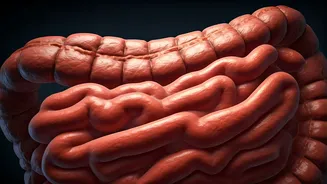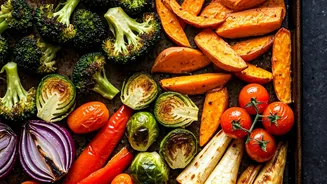Bloating: What's happening?
Bloating, often characterized by a feeling of fullness and tightness in the abdomen, arises from a buildup of gas in the digestive tract. This gas can
be caused by various factors, including the foods you consume, the speed at which you eat, and underlying medical conditions. When food isn't properly broken down in the stomach and small intestine, it can ferment in the large intestine. This fermentation produces gas, leading to bloating. Some people are more sensitive to gas production, leading to more pronounced bloating. Understanding the root causes of bloating is the first step toward effective management. Identifying trigger foods and understanding individual tolerances are crucial for developing personalized strategies. Addressing the underlying causes, rather than just treating symptoms, can lead to long-term relief and improve overall digestive health.
Common Bloating Culprits
Certain foods are notorious for causing bloating. High-FODMAP foods (Fermentable Oligosaccharides, Disaccharides, Monosaccharides, and Polyols) are common triggers. These include fruits like apples, pears, and mangoes, and vegetables like onions, garlic, and broccoli. Legumes, such as beans and lentils, also contain compounds that can produce gas during digestion. Dairy products, due to lactose intolerance, can lead to bloating in some individuals. Fizzy drinks and foods high in sodium contribute to fluid retention, exacerbating bloating. Processed foods, often containing artificial sweeteners and additives, may also contribute to bloating. Identifying these common culprits allows for conscious dietary choices and proactive management of bloating symptoms. Keeping a food diary can help pinpoint specific foods that trigger bloating, allowing for tailored adjustments to your diet.
Dietary Adjustments for Relief
Modifying your diet can significantly reduce bloating. Start by identifying and limiting intake of trigger foods. Increase your fiber intake gradually to avoid sudden increases in gas production; soluble fiber is often better tolerated than insoluble. Drink plenty of water to aid digestion and prevent constipation. Chew your food thoroughly and eat slowly to reduce air swallowing, a contributor to bloating. Consider incorporating probiotics into your diet to improve gut health and balance gut bacteria. Avoiding or reducing processed foods, which are often high in sodium and unhealthy fats, can further contribute to reducing bloating. Explore options like low-FODMAP diets under the guidance of a healthcare professional. These dietary changes, when implemented consistently, can lead to substantial improvements in digestive comfort and well-being.
Lifestyle Changes & Beyond
Beyond diet, several lifestyle adjustments can help manage bloating. Regular exercise can improve digestion and reduce gas buildup. Stress management techniques, such as yoga or meditation, can ease gut symptoms, as stress can worsen digestive issues. Avoid eating quickly and overeating, as this can trap excess air in the digestive system. Consider the use of over-the-counter remedies like simethicone or activated charcoal, but consult a doctor first. If bloating persists or is accompanied by other symptoms like abdominal pain, weight loss, or changes in bowel habits, it's essential to seek medical advice. This may indicate an underlying medical condition needing attention. A healthcare professional can help you establish the cause and suggest treatment options.


















